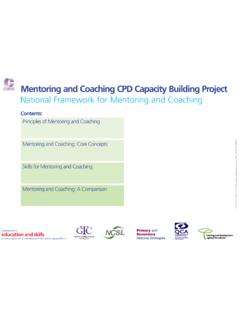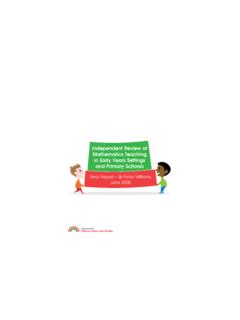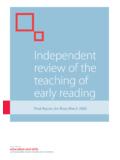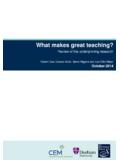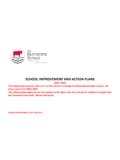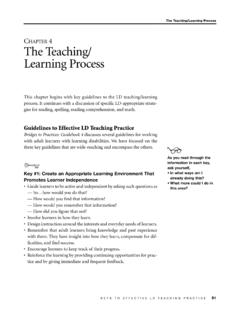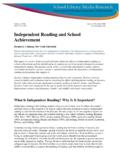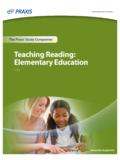Transcription of What is independent learning and what are the benefits for ...
1 what is independent learning and what are the benefits for students? Author(s): Bill Meyer, Naomi Haywood, Darshan Sachdev and Sally Faraday Publisher: London: Department for Children, Schools and Families Research Report 051, 2008. [Original title: independent learning : Literature Review]. How is independent learning viewed by teachers? independent learning ' is often linked with other approaches to learning such as personalisation', student-centred learning ' and ownership' of learning . Discussion of independent learning frequently arises in the context of important issues such as student- teacher roles and relationships, and the role of information and communications technology (ICT) in learning . The aim of this literature review was to identify reliable, robust and relevant research to provide a detailed picture of independent learning and its possible impact on students.
2 The review found a number of different terms to describe independent learning , the most common reflecting the idea of self-regulated learning '. The review highlighted some evidence of benefits to students particularly in the form of improved motivation and better management of their learning . The authors of the review emphasised that independent learning does not merely involve students working alone and stressed the important role teachers can play in enabling and supporting independent learning . The review suggested that successful independent learning depends on a number of external and internal factors. External factors involve the creation of a strong relationship between teachers and students and the establishment of an enabling environment' in which ICT can be an important element.
3 Internal factors are the skills that individual students have to acquire. These include cognitive skills such as focusing of memory and attention and problem-solving, metacognitive skills associated with an understanding of how learning occurs, and affective skills related to feelings and emotions. Contents what were the benefits of independent learning for students? what were the key elements of independent learning ? what skills did the students need? How did teachers promote independent learning ? How did schools support independent learning ? How was the study carried out? what are the implications of the study for practitioners? Where can I find out more? what were the benefits of independent learning for students? The review found some evidence of the benefits of independent learning , including: improved academic performance.
4 Increased motivation and confidence;. greater student awareness of their limitations and their ability to manage them;. enabling teachers to provide differentiated tasks for students; and fostering social inclusion by countering alienation. The authors found widespread evidence of improved academic performance but acknowledged that this could not always be related solely to independent learning approaches. One example from the UK they refer to is from Thomas Telford School, the first comprehensive school in which 100% of students gained A C grades in at least five GCSEs. The school claimed that one of the reasons for this success was the development of independent learning skills across the school. A study from the Netherlands suggested that: Students in self-regulated learning environments are more motivated to learn, report more enjoyment of the material and are more actively involved in their learning than those who study in more restrictive environments.
5 Other research examined the effects of a number of interventions aimed at improving the education of African Caribbean boys in London boroughs. It found that the teaching and development of study skills, such as revision techniques, essay writing and problem solving, was important, particularly when integrated with strategies aimed at countering alienation. Supporting students in self-regulation, providing feedback and helping them highlight progress was found to be especially important among remedial readers and other students with special educational needs. Studies in the review found that using independent learning approaches enabled teachers to organise a wider range of activities in their classrooms and to focus more on teaching and learning than on organization or behaviour. For example it enabled teachers to work with specific groups while other groups worked independently.
6 Two studies suggested that students who are independent learners work to higher standards, are more motivated and have higher self-esteem than other children. The students develop skills that help them further their own learning by using their own ideas to form opinions; solving problems and using a range of strategies in their learning . what were the key elements of independent learning ? The review authors suggested that the key ingredient in independent learning was the shift of responsibility for the learning process from the teacher to the student. This involved students acquiring an understanding of their learning , being motivated to learn and collaborating with teachers to structure their learning environment. They found a consensus in the literature that independent learning did not merely involve students working alone.
7 Teachers have a key part to play in enabling and supporting independent learning though, for example, structuring group work. Whilst offering a number of models for self- learning the review authors conceptualised independent learning in terms of processes of self-regulation. These were organised around four or more phases for students to complete including: planning, self-monitoring, controlling the pace and direction of the work and evaluation. Evaluation included students'. feelings of pleasure or otherwise. Self-motivation was also identified as necessary for successful independent learning . External' elements which supported independent learning included the development of a strong relationship between teachers and students, and the establishment of an enabling environment'. Research in the review described an enabling environment' as one which included an appropriate physical environment', a flexible approach to time that teachers gave students to work on specific tasks and a shared willingness to undertake independent learning on the part of students.
8 Appropriate resources were also necessary and it was important that teachers were knowledgeable about the work being done. An essential element of independent learning identified in the review was positive relationships between teachers and students, based on trust. A mutual responsibility for learning , which drew in students' experiences in their family and local community, was also necessary. The skills which the review found to be necessary for successful engagement in independent learning are covered in the next section. what skills did students need? The review identified a number of skills that students needed to acquire in order to engage successfully in independent learning : Cognitive skills: such as being able to construct informal rules for solving problems;. classify objects according to given criteria; form hypotheses; and reason logically.
9 The review authors suggested that these skills were important for creating learner readiness'. An early years study cited in the review concluded that by the age of seven, with the right assistance, students are generally able to hold an internal dialogue using thinking language'. Metacognitive skills: the review found evidence that Year 6 students were able to describe how they learn, and to identify key activities essential for learning such as listening, remembering, applying previously learnt knowledge and using formal strategies. One group of students specifically referred to the look, cover, write, check' strategy. Other studies highlighted the importance of students being able to reflect on what they had done, monitor their progress and use self-assessment in order to take responsibility for their own learning .
10 Affective skills: these skills are related to managing feelings. Studies in the review identified motivation as the most important affective attribute in relation to independent learning . One study suggested that another important affective skill, which is related to motivation, is delay of gratification'. This refers to the ability to wait for achievement outcomes. How did teachers promote independent learning ? The review stressed the key role of teachers in assisting students to become independent learners by ensuring that students were actively involved in learning . The research found a number of strategies that supported students' independent learning including: scaffolding: this refers to the supportive structure provided by skilled others, in this case teachers, which aids students in their learning .


